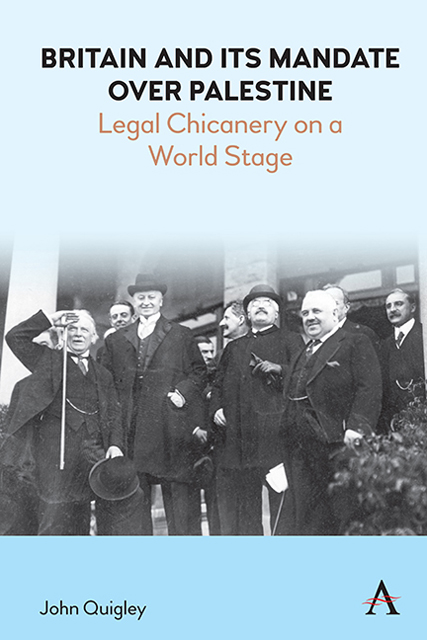Book contents
- Frontmatter
- Contents
- Preface
- Setting the Stage: Was Britain’s Rule in Palestine Legal?
- 1 The Balfour Declaration Is the Focal Point for the Legal Situation of Palestine
- 2 The Balfour Declaration Was a Binding Commitment to the Jewish People
- 3 The Jewish National Home Meant a Jewish State
- 4 The Balfour Declaration Was Issued to Affirm Jewish Rights in Palestine
- 5 The Paris Peace Conference Raised Jewish Statehood to the International Level
- 6 Britain’s Allies Made the Balfour Declaration an International Commitment
- 7 Britain’s Allies Endorsed Jewish Rights
- 8 Britain Took on Palestine Because of the League’s Mandate System
- 9 The League of Nations Protected Palestine’s Arab Population
- 10 Britain Was Given Palestine by the League of Nations
- 11 The League of Nations Put the Palestine Mandate into Legal Force
- 12 The Peace Treaty with Turkey Legalized Britain’s Status in Palestine
- 13 The Palestine Mandate Document Was a Treaty between Britain and the League
- 14 The League of Nations Required Britain to Implement the Balfour Declaration
- 15 The Palestine Mandate Document Implemented the League Covenant
- 16 The Palestine Mandate Document Recognized Jews as a National Group
- 17 The Palestine Mandate Document Bound Britain to the Balfour Declaration
- 18 The International Community Committed Itself to the Balfour Declaration
- 19 Britain Held Legal Status in Palestine
- 20 The United Nations Charter Carried Forward a Jewish Entitlement to Statehood
- Postscript: Why History Matters
- Documents Annex
- Notes
- Bibliography
- Index
3 - The Jewish National Home Meant a Jewish State
Published online by Cambridge University Press: 10 January 2023
- Frontmatter
- Contents
- Preface
- Setting the Stage: Was Britain’s Rule in Palestine Legal?
- 1 The Balfour Declaration Is the Focal Point for the Legal Situation of Palestine
- 2 The Balfour Declaration Was a Binding Commitment to the Jewish People
- 3 The Jewish National Home Meant a Jewish State
- 4 The Balfour Declaration Was Issued to Affirm Jewish Rights in Palestine
- 5 The Paris Peace Conference Raised Jewish Statehood to the International Level
- 6 Britain’s Allies Made the Balfour Declaration an International Commitment
- 7 Britain’s Allies Endorsed Jewish Rights
- 8 Britain Took on Palestine Because of the League’s Mandate System
- 9 The League of Nations Protected Palestine’s Arab Population
- 10 Britain Was Given Palestine by the League of Nations
- 11 The League of Nations Put the Palestine Mandate into Legal Force
- 12 The Peace Treaty with Turkey Legalized Britain’s Status in Palestine
- 13 The Palestine Mandate Document Was a Treaty between Britain and the League
- 14 The League of Nations Required Britain to Implement the Balfour Declaration
- 15 The Palestine Mandate Document Implemented the League Covenant
- 16 The Palestine Mandate Document Recognized Jews as a National Group
- 17 The Palestine Mandate Document Bound Britain to the Balfour Declaration
- 18 The International Community Committed Itself to the Balfour Declaration
- 19 Britain Held Legal Status in Palestine
- 20 The United Nations Charter Carried Forward a Jewish Entitlement to Statehood
- Postscript: Why History Matters
- Documents Annex
- Notes
- Bibliography
- Index
Summary
By referencing the Balfour Declaration in the 1948 proclamation of Jewish statehood, the founders of Israel took the Balfour Declaration to mean that Britain had promised a state. The meaning of the Balfour Declaration in that regard was a matter of debate all through the period Britain governed Palestine. The Zionist Organization aimed for statehood, and it played a role in implementing British policy in Palestine. The Balfour Declaration itself, however, avoided any definition of “national home.”
The context of the adoption and delivery of the statement provides clues. The War Cabinet, in instructing Balfour to convey its statement to the English Zionists, asked him to “take a suitable opportunity of making the following declaration of sympathy with the Zionist aspirations.” The Zionists aspired to statehood. In the communications leading up to the issuance of the Balfour Declaration, the English Zionists pressed for a statement that would strongly imply an aim of statehood. Draft language was exchanged that would have recited that the Government “accepts the principle that Palestine should be reconstituted as the National Home of the Jewish people.” The War Cabinet's rejection of such phrasing was deliberate. The Balfour Declaration did not by its terms envisage Jewish statehood in Palestine.
In the aftermath of World War I, protection of minority groups was high on the international agenda. New borders were generating new minorities. For example, a German population group who found themselves within Poland as a result of a border shift came to be protected by treaty, so that they could continue to develop in a German cultural environment. Germans inhabiting the sector of Poland in question were guaranteed a right to conduct primary schooling in the German language, in schools funded by the Polish government. In Palestine, the Jews, similarly, were expected to be a minority, hence “national home” might mean something similar. The treaty on Poland did not, to be sure, use the term “national home,” but the term served readily as shorthand for what was spelled out in that treaty.
Concern immediately arose on the Arab side in any event about what the War Cabinet had in mind. Hussein bin Ali asked the British Government to clarify.
- Type
- Chapter
- Information
- Britain and its Mandate over PalestineLegal Chicanery on a World Stage, pp. 17 - 22Publisher: Anthem PressPrint publication year: 2022

